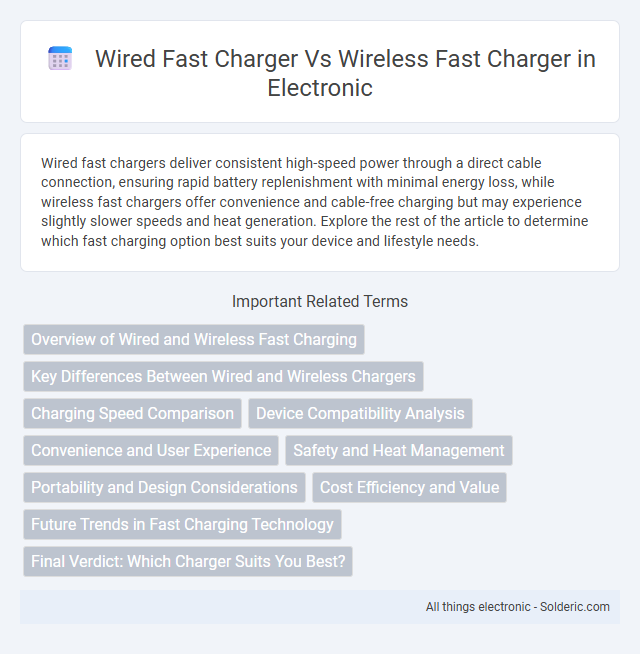Wired fast chargers deliver consistent high-speed power through a direct cable connection, ensuring rapid battery replenishment with minimal energy loss, while wireless fast chargers offer convenience and cable-free charging but may experience slightly slower speeds and heat generation. Explore the rest of the article to determine which fast charging option best suits your device and lifestyle needs.
Comparison Table
| Feature | Wired Fast Charger | Wireless Fast Charger |
|---|---|---|
| Charging Speed | Up to 65W or higher | Up to 15W typically |
| Connection Type | USB-C, Lightning, or Micro USB cable | Qi wireless standard |
| Convenience | Requires cable connection | Cable-free, place device on pad |
| Heat Generation | Moderate heat during charging | Higher heat, may reduce efficiency |
| Portability | Depends on cable length | Compact charging pad |
| Device Compatibility | Universal with correct cable | Devices supporting Qi wireless charging |
| Price Range | Typically $10-$50 | Typically $20-$80 |
Overview of Wired and Wireless Fast Charging
Wired fast chargers deliver higher power output directly through a cable, enabling quicker charging times and greater efficiency for smartphones and devices supporting fast charge protocols like USB Power Delivery or Qualcomm Quick Charge. Wireless fast chargers use electromagnetic induction to charge compatible devices without cables, offering convenience and reduced wear on charging ports, though they typically provide slightly slower charging speeds compared to wired options. Your choice depends on balancing charging speed versus ease of use, as wired chargers excel in rapid power delivery while wireless chargers prioritize hassle-free experience.
Key Differences Between Wired and Wireless Chargers
Wired fast chargers deliver power directly through a cable, ensuring faster and more consistent charging speeds, often reaching up to 30W or more. Wireless fast chargers use electromagnetic induction to transfer energy, typically providing slower charging rates around 7.5W to 15W due to heat generation and alignment sensitivity. Wired chargers generally offer higher efficiency and compatibility with a wider range of devices, while wireless chargers prioritize convenience and ease of use without the need for cables.
Charging Speed Comparison
Wired fast chargers typically deliver higher power output, enabling charging speeds up to 50% faster than wireless fast chargers under optimal conditions. Wireless fast chargers, while convenient, often experience efficiency losses due to heat and alignment issues, resulting in slower charging rates compared to their wired counterparts. For the fastest and most reliable charging experience, your device will benefit more from a high-wattage wired fast charger.
Device Compatibility Analysis
Wired fast chargers offer broader device compatibility, supporting a wide range of smartphones, tablets, and laptops with various charging protocols like USB Power Delivery and Quick Charge. Wireless fast chargers require your device to support specific wireless charging standards such as Qi, limiting compatibility primarily to newer models. Choosing between wired and wireless fast charging depends on your device's technology and whether you prioritize speed or convenience.
Convenience and User Experience
Wired fast chargers provide quicker and more reliable power delivery, ensuring devices reach full charge in less time, which is ideal for users needing rapid replenishment. Wireless fast chargers offer unparalleled convenience by eliminating cable clutter and enabling effortless device placement, enhancing user experience especially in multi-device or on-the-go scenarios. However, wireless charging speeds often lag behind wired counterparts due to energy transfer limitations, impacting overall charging efficiency despite improved ease of use.
Safety and Heat Management
Wired fast chargers typically offer better safety features due to direct connection and controlled power delivery, reducing risks of overheating and electrical faults. Wireless fast chargers generate more heat during operation as energy transfer through electromagnetic fields is less efficient, requiring advanced heat management technologies to prevent device damage. Both types incorporate temperature sensors and automatic shut-off mechanisms, but wired chargers generally maintain lower operating temperatures, enhancing device longevity and user safety.
Portability and Design Considerations
Wired fast chargers often feature compact, lightweight designs that enhance portability by minimizing bulk and enabling easy storage in bags or pockets. Wireless fast chargers prioritize sleek, minimalist aesthetics with flat surfaces and sometimes built-in stands, offering convenience but generally requiring a stable placement during use, which may reduce portability compared to wired options. Your choice depends on whether you value lightweight, on-the-go charging or stylish, cable-free setups for home or office environments.
Cost Efficiency and Value
Wired fast chargers generally offer greater cost efficiency, delivering faster charging speeds at a lower price point compared to wireless fast chargers. Wireless fast chargers provide convenience and a sleek design but often come with higher costs and slightly reduced charging efficiency. For your charging needs, wired options deliver better value by maximizing charging speed while minimizing expenditure.
Future Trends in Fast Charging Technology
Wired fast chargers currently provide higher power delivery speeds, reaching up to 120W for certain smartphones, ensuring rapid battery replenishment. Wireless fast charging technology is advancing with innovations like magnetic alignment and enhanced coil designs, pushing power output beyond 30W and improving efficiency. Future trends indicate a convergence where wireless chargers may rival wired speeds, supported by developments in GaN and graphene materials, promising faster, safer, and more convenient charging solutions.
Final Verdict: Which Charger Suits You Best?
Wired fast chargers deliver consistent, high-speed power transfer ideal for rapid device charging, making them perfect for users needing quick, reliable energy boosts. Wireless fast chargers offer the convenience of cable-free charging, enhancing ease of use and reducing wear on charging ports, but may charge slightly slower depending on device compatibility. Your choice depends on whether you prioritize speed and efficiency with wired options or prefer the seamless, tangle-free experience provided by wireless fast charging.
Wired fast charger vs Wireless fast charger Infographic

 solderic.com
solderic.com